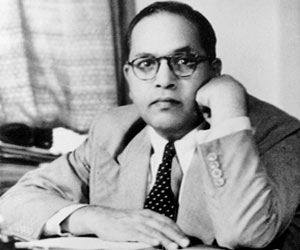Ambedkar BR
Bhimayana: Experiences of Untouchability is a graphic novel narrates episodes from the life of Ambedkar using Pardhan-Gond style by Durgabai Vyam and Subhash Vyam. The book published by Navayana Books was identified as one of the top 5 political graphic novel by CNN. Author Prabhakar Joshi, began writing a biography of Ambedkar in Sanskrit in 2004. Joshi is a recipient of Maharashtra Government's 'Mahakavi Kalidas' award. The completed work, Bhimayan, comprises 1577 shlokas and is intended as an atonement for the injustice done to the young Bhimrao by some teachers.
Political tyranny is nothing compared to the social tyranny and a reformer who defies society is a more courageous man than a politician who defies Government. B. R. Ambedkar Government, Society, Political
Among the Aryans the etiquette for receiving important guests had become settled into custom and had become a ceremony. The most important offering was Madhuparka. A detailed description regarding Madhuparka are to be found in the various Grahya Sutras. According to most of the Grahya Sutras there are six persons who have a right to be served with Madhuparka namely, Ritwija or the Brahmin called to perform a sacrifice, Acharya, the teacher, The bridegroom The King The Snatak, the student who has just finished his studies at the Gurukul and Any person who is dear to the host. Some add Atithi to this list. Except in the case of Ritvija, King and Acharya, Madhuparka is to be offered to the rest once in a year. To the Ritvija, King and Acharya it is to be offered each time they come.
Ultimo di quattordici tra fratelli e sorelle, Ambedkar nacque in una famiglia di tradizione militare, prima nell'esercito privato della Compagnia delle Indie poi nell'esercito dell'India Britannica. Nel 1894 col pensionamento dall'esercito del padre e la morte della madre la famiglia si trasferì a Satara e in breve solo cinque tra fratelli e sorelle sopravvissero. Grazie alle istituzioni militari Ambedkar poté studiare e fu il solo della sua famiglia a superare gli esami giungere a iscriversi in un istituto superiore, dove il suo insegnante gli mutò il cognome nei registri scolastici dall'originario Ambavadekar in Ambedkar. Nel 1898 Ambedkar si trasferì quindi a Bombay divenendo studente al Government High School. Nel 1907 si iscrisse alla University of Bombay divenendo il primo studente universitario fuoricasta di tutta l'India, presentandosi con una biografia del Buddha col docente Krishnaji Arjun Keluskar. Ricevette una borsa di studio, 25 rupie mensili, da parte di Sayyaji Rao Gaekwad III, mahārāja di Baroda. Si sposò con un matrimonio imposto, secondo costume hindu, con Ramabai, di nove anni. Laureatosi in economia e scienze politiche nel 1912, divenne padre di Yashwant e, nel 1913, rimase orfano anche di padre. Nel 1913, con una borsa di studio di 11,5 sterline mensili, si iscrisse a un triennio di dottorato alla Columbia University di New York. Presentatosi con una tesi Ancient Indian Commerce, completò gli studi di economia nel 1916 con la tesi National Dividend of India-A Historic and Analytical Study. Nello stesso anno si trasferì a Londra dove si iscrisse ai corsi di diritto al Gray's Inn e ai corsi di economia alla London School of Economics and Political Science. Nel 1917, con la fine della borsa di studio, fu costretto a tornare in India, ma i suoi libri - inviati su un battello a vapore - furono affondati da un sottomarino tedesco. Nel 1920 a Bombay iniziò la pubblicazione della rivista Mooknayak, critica del sistema sociale castale hindu. A Kolhapur, dopo un suo discorso contro la discriminazione castale, Shahu V, il mahārāja locale, lo definì il "futuro leader nazionale" e, dopo aver pranzato con Ambedkar - lasciando la società ortodossa completamente scioccata - gli garantì un aiuto economico per proseguire gli studi interrotti a Londra. Con le lauree conseguite nel 1922 iniziò la sua pratica forense, vincendo cause celebri in difesa di non-bramini contro bramini.
Bibliography
B. R. Ambedkar 1970, Viewed 14 April 2015, <http://en.wikipedia.org/wiki/B._R._Ambedkar>.
B. R. Ambedkar 1970, Viewed 14 April 2015, <http://it.wikipedia.org/wiki/B._R._Ambedkar>.
B. R. Ambedkar Quotes 1970, Viewed 14 April 2015, <http://www.brainyquote.com/quotes/authors/b/b_r_ambedkar.html>.
Did Hindus Never Eat Beef? By BR Ambedkar 1970, Viewed 14 April 2015, <http://www.countercurrents.org/ambedkar050315.htm>.
<
No comments:
Post a Comment